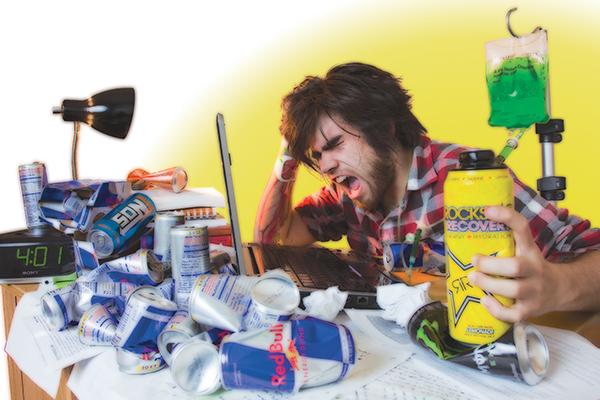Sugar, caffeine and energy, oh my!

Energy Drinks::Photo Illustration by Robert Linggi – State Hornet
February 16, 2011
Oh my god, I am so wired right now, I mean, I just had this energy drink that just has me going, I don’t know how to handle it, which is awesome because I totally stayed up late last night and this is totally rocking my socks!
CRASH.
This is what many students experience after consuming energy drinks, beverages that have become popular over the years. From Monster to Rockstar to Red Bull, these cans hit the shelves in the late “90s and have pervaded stores ever since. We see them in gas stations, supermarkets and even on campus.
Unfortunately, many sleep-deprived students rely on these highly caffeinated beverages to get them through the day. Nutritionist Shauna Schultz and health educator Cyndra Krogen-Morton answer the questions.
What are the negatives about energy drinks?
From a weight management perspective, Schultz said energy drinks tend to provide many empty calories through the high amounts of sugar.
“When you drink things that have calories, your brain doesn’t think of it as food or you don’t feel full,” Shultz said. “You’re just drinking extra calories.”
Besides the caloric intake, Shultz said energy drinks also provide high amounts of caffeine – a stimulant she believes causes an increase in heart rate when consumed excessively.
“Caffeine is a stimulant, so it helps people stay awake,” Shultz said. “The heart rate rises, which can make people feel restless or anxious, which can ultimately lead to sleep problems.”
Not to mention the impact this has on your wallet, she said.
“Instead of buying empty calories, spend the money on an actual meal that will provide nutrients to keep you going longer,” Schultz said.
Is caffeine really harmful?
“Caffeine in moderation can be fine, but we need to know how much we are consuming and how we react to it,” Shultz said.
Even though there is not a set standard for acceptable caffeine intake, Shultz said most health authorities say about 3 cups of regular black coffee or 300 to 400mg per day is a moderate amount.
The problem with energy drinks, she added, is companies’ unwillingness to disclose just how much caffeine is in their products, with some having about 500mg of caffeine per can.
“By calling it a supplement, it does not have to undergo the same testing as other food products,” Shultz said. “The Food and Drug Administration is not guaranteeing purity, safety or effectiveness.”
The only time something is pulled off the shelf for dangerous reasons, she said, is when something drastic has happened, as with the popular alcoholic energy drink Four Loko.
In November of 2010, Krogen-Morton said officials removed Four Loko from the stores after an incident regarding students at Central Washington University in Ellensburg, Washington. She said the students had consumed too many Four Lokos and almost died from alcohol poisoning.
“Officials were able to prove that the drinks caused the students to be unaware of how much they were actually drinking due to the caffeine stimulation,” Krogen-Morton said.
What happens when you mix alcohol with energy drinks?
According to Krogen-Morton, the FDA recently banned alcoholic energy drinks from the market due to the dangers of mixing a stimulant with alcohol.
“The problem when you mix alcohol with caffeine is that the consumers do not really know how much alcohol they are consuming,” Krogen-Morton said. “The caffeine keeps them awake and wanting to drink more, when alcohol without the caffeine would have just made them tired.”
The amount of caffeine in a Four Loko beverage is what you’d get in 3 cups of coffee, Krogen-Morton said.
“The stimulation mixed with alcohol really sets people up for alcohol poisoning,” Krogen-Morton said.
Are there alternatives for gaining energy?
Instead of reaching for the energy drink, Shultz said, try getting more sleep.
“A lot of people relate their low energy levels to their diet, when it’s really just sleep deprivation,” Shultz said.
Eating at regular intervals is also recommended, she said, so that energy is gained from actual food rather than fortified vitamins and caffeine.
“Frequent healthy snacking makes sure you’re fueling regularly so you have that energy to get you throughout the day,” Shultz said. “It’s definitely going to help with concentration and you aren’t going to crash.”
If the need for caffeine still exists, she said, stick to the original cup of black coffee or tea.
“You’re still going for the stimulant, but you aren’t over doing it,” Shultz said. “Coffee or tea is not added with other stimulants and you can control the amount of sugar you put in it.”
Should the campus ban energy drinks?
Schultz and Krogen-Morton agree that ridding the campus stores of these beverages would be beneficial to the students.
“Although the campus has made great strides in promoting health on campus, especially through the construction of the Well, a ban of energy drinks would not necessarily be such a bad idea,” Krogen-Morton said.
Even though banning energy drinks would not completely stop the consumption, she admits, not having the beverages available would promote healthier choices among students.
When asked about her opinion on this, junior Spanish major Rebecca Montes said that students would continue to drink energy regardless of the availability on campus.
“I pick up my energy drinks before I come to campus,” Montes said. “If you’re going to ban energy drinks, you might as well ban the other sources of caffeine as well.”
Erin Rogers can be reached at [email protected]






















































































































